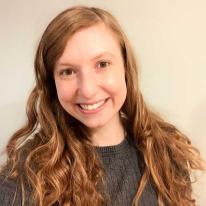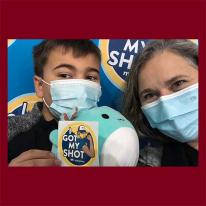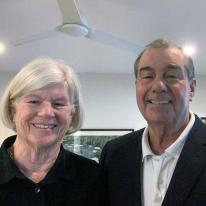The Synapse Feb. 2022
Fostering Creativity in Adolescents
A team of University of Minnesota scientists, clinicians, designers, and artists led by Kathryn Cullen, MD, and the Weisman Art Museum will collaborate on a Research Lab that explores creativity in adolescents through arts engagement.

Supported by the National Endowment for the Arts (NEA) and the University of Minnesota, the keystone project of this 10-year program will involve a one-year adolescent arts program to serve as a mini-laboratory, with a diverse group of adolescents serving as co-creators of knowledge with the scientists and artists on the research team. Together, they will explore cognitive and social processes of creativity in the context of arts engagement, and co-develop an MRI experiment to measure brain processes during meaningful creative contemplation.
Both qualitative and quantitative methods will be used to examine the program's impact on youth outcomes. The adolescents’ artwork created during the program will be showcased during a Weisman Art Museum exhibit at the end of the year. Subsequent stages of the 10-year research lab will build on the insights gained in the keystone study.
In addition to Cullen, the NEA Research Lab Collaborative Team includes Abimbola Asojo, PhD, Gail Bernstein, MD, Mark Fiecas, PhD, Bonnie Klimes-Dougan, PhD, Wilma Koutstaal, PhD, Angie Mejia, Bryon Mueller, PhD, Boris Oicherman, PhD, Yuko Taniguchi, and Peng Wu.
"I am thrilled to have the opportunity to work together with this amazing interdisciplinary team," said Cullen. "Adolescence is such a critical time for brain development and identity formation—this is when we figure out who we are, and what we want to pursue in this life.That's why engaging in the arts during this time is so important, because discovering and fostering young people's creative talents during these years will have life-long impacts. Our work will take an in-depth look at these processes, and advance the field by providing new tools for future research."
This research builds on previous work by Cullen and Taniguchi in the Target Studio for Creative Collaboration of the Weisman Art Museum, Asojo’s youth Diversity in Design programs, Mejia’s expertise in community-based participatory research, Koutstaal’s research on fostering creativity, and recent collaborations by Cullen, Klimes-Dougan, Mueller and Fiecas on brain flexibility in youth.

Advancing Interdisciplinary Self-Injurious Behavior/ Nonsuicidal Self Injury Research
Congratulations to Caroline Roberts, a PhD student and graduate research assistant in the Department of Educational Psychology, who has been awarded an Interdisciplinary Doctoral Fellowship for the 2022-23 academic year. “It's a dream come true to get to work at a place like MIDB and to learn from such inspiring experts on a topic with deep personal meaning for me,” said Roberts, who is also a graduate of the Minnesota Leadership Education in Neurodevelopmental and Related Disabilities (MNLEND) Program. Roberts plans to use the fellowship to facilitate knowledge translation between the fields of special education and psychiatry related to the issue of self-harm. Read more.

Sensory-Friendly Vaccine Sites
Several MNLEND program fellows—current and past—have played key roles in bringing sensory-friendly vaccine clinics to children and families in the Minneapolis-St. Paul area. The fellows collaborated with several other partners to create COVID-19 vaccination clinics with quiet rooms, music therapy, a drive-thru option, and distraction techniques. “At most vaccine events, the goal is getting as many shots in arms as possible,” said Maren Christenson Hofer (MNLEND 2018–19). “Our primary goal was creating the best possible experience and to bring some compassion and understanding to children and families, who may have experienced past trauma or have ongoing anxiety in these settings.” Read more.

Supporting MIDB
Thank you to longtime U of M supporters Liz and Van Hawn who recently made a generous gift to support MIDB. “Van and I chose to donate to MIDB because of its potential to connect families to services, services to community, patients to research, and research to practice in an approachable, user friendly setting,” said Liz. “Brain health is a rapidly evolving field of study and MIDB, side by side with the impressive magnetic resonance imaging capabilities available at the University of Minnesota, will establish a valuable resource for multiple constituencies both locally and nationally.” Learn more about philanthropy efforts to advance MIDB’s groundbreaking work in early-child and adolescent brain health.

Jason David Schleien Memorial Scholarship
The Jason David Schleien Memorial Scholarship offers $3,000 to qualified students who actively promote the community inclusion of individuals with disabilities, disadvantaged youth, and other underserved populations. These activities could take place in the fall, spring or summer. Students must be enrolled full-time at the U’s College of Education and Human Development and report their experiences to the Schleien family after completing the project. Applicants should submit a one-page proposal outlining their interest in the stated examples of areas of study and working with the relevant populations. Read more about this scholarship opportunity.



